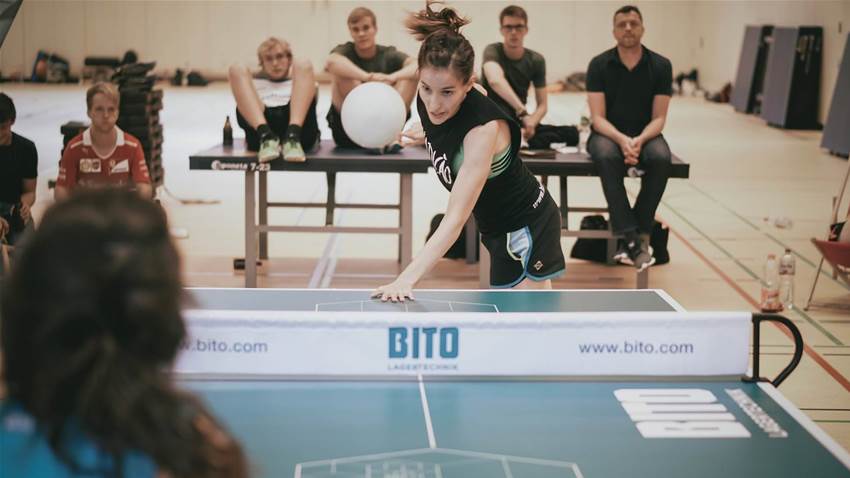What do you get when you combine football headers and table tennis? More than you might think. Cue the next sport-of-the-future candidate …
Wegner was a sports studies student at university, which was meant to complement his pursuits in snowboarding. But after he returned from a stint in Vancouver, it dawned on him that all the business strategy and marketing he had studied were just as applicable to this activity he and his mates had mucked together.
“We were shooting at a barbecue at my parents’ house, a tournament,” Wegner recalls. “We called it ‘the world championship’ because everybody who was playing in the world was playing. We edited that video and had the premiere in a cinema. And all from that, there was media in Germany right away – one of the biggest late-night shows, we were there really early, after a few months already. And it wasn’t a sport, you know? It was still an idea.
“But the response was always there. From that, we build on it.”

Wegner was on the road 120 days last year in a dozen different countries, heading (pardon the pun) as far afield as South Africa and the Dominican Republic to introduce the sport. Headis has a program to get into school sport. It also continues to promote its associations with professional clubs in the Bundesliga, and Wegner has travelled to London to shoot a video with Arsenal. Headis also holds a dozen top-level tournaments a year, feeding those viral highlight reels which play a significant role in getting the sport out there.
The Headis story rather does resemble the plot of BASEketball, a 1998 movie made by the creators of South Park. In the movie, a pair of childhood friends invent a baseball/basketball hybrid in their driveway, and it eventually catches on in popularity – so much so that it eventually becomes a big-time professional sport in its own right, and succumbs to the crass commercialism that it once was seen as a remedy.
Wegner’s concept for his sport is acutely aware of this temptation; Headis definitely has opportunities to make money, but remains devoted to a grassroots ethos. While other sports do activations, Wegner goes to university O-weeks and start-up clubs. “We want it to spread further. But the spirit should stay the same – everybody likes to be active, be a part of it, way more than being commercialised too much.”
Again, it’s in the DNA of the game that understands it doesn’t take itself too seriously. How else to explain another essential bit of Headis culture, every player goes by a nickname. Wegner is “Headi Potter”; top players have handles such as Headsinfarkt and Sebastian Headdel. Headis’s Australian chief Andre Sakr goes by “Head Honcho” – “I had to explain it to the Germans,” he says. “They didn’t know what it meant.”
Says Wegner on the names: “The beginning was out of that wrestling illusion. We like it so much, it reflects that we don’t want it to be that serious … some guys, I don’t even know their real name. I just know their nicknames.
“When it developed, we had to think about it – yeah, for sure, we want this because it shows the sport is meant to be fun. So, first organic, and then conscious.”
The first ever Australian Headis tournament will be held in Sydney on June 2. For more information, check out www.headis.com.au
Related Articles

Yannik Paul races to Indian Open lead, Quayle lurking

Popov relishing Women's Open defence













